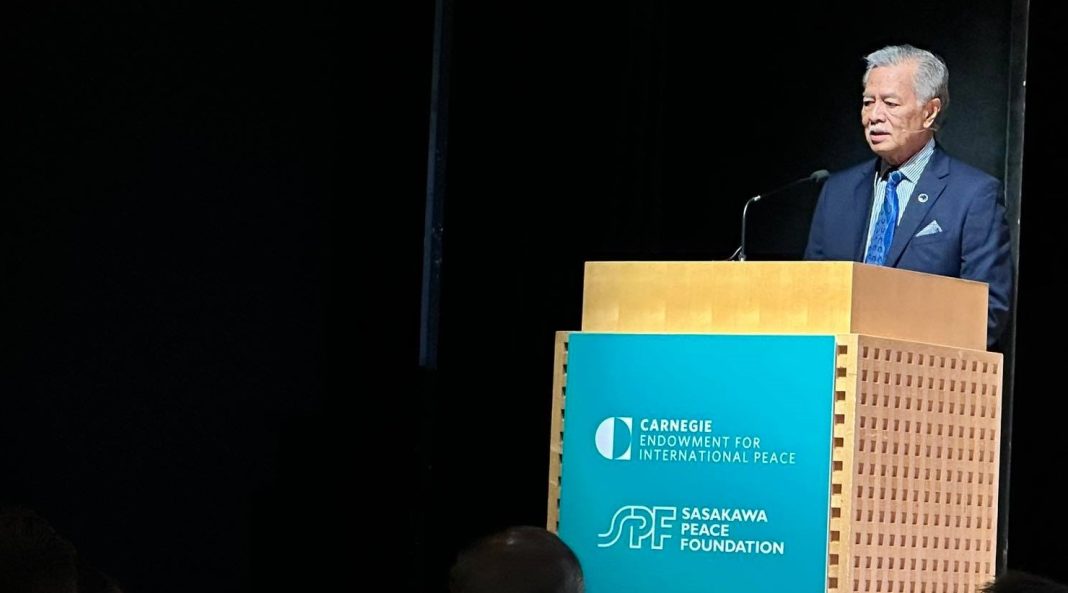Pacific Islands Forum Secretary General, Henry Puna has warned the geopolitical contestation and strategic manipulation in contested Blue Pacific are unsettling.
Speaking at the Carnegie-SPF 3rd annual Indo-Pacific Islands Dialogue in New York, Puna said the Blue Pacific continent is an increasingly contested space.
“Regional and national stability is critical to maintaining and protecting peace and security, prosperity, and the well-being of all Pacific peoples. If I’m honest we must realise that the strategic interest and attention we enjoy today, will not last forever. And we must capitalise on it in a manner that will ensure sustainable gains for our region and for our people, for decades to come.
“Our partnerships must be genuine and durable, and premised on understanding friendship, mutual benefit, and a collective ambition to achieve sustainable results,” said SG Puna.
He said that we live and exist in an increasingly polarised world — a world which continues to be dominated by the geopolitical tussle between two global superpowers.
“In the Pacific, we witnessed the introduction of foreign policy ideologies that seek to embed contrasting worldviews into our regional norms and standards. We see the strategic neglect of 10 years ago, being replaced by the proliferation of regional strategies and consortiums that serve to shape and influence engagement with and in our region — tantamount to, if I put it quite frankly, strategic manipulation.
“We see these points of external influence increasingly creep into all facets of our operations, both at the national and at the regional level.
“For far too long now, we have been regarded as mere dots or specks in the Great Pacific Ocean.
“We have had to contend with and manage the challenges of our geographical isolation, the tyranny of distance and the scarcity of resources in our island economies. But where we lacked individual endowment, we made up for in collective opportunities and resources,” SG Puna explained.
This for us has driven the development of the 2050 strategy for the blue Pacific continent, he said.
“For us, this is more than just a strategy. It is a political commitment to Pacific regionalism by 18 heads of state and governments throughout the Pacific region.
“It is a collective vision for our future and the future of our people. It sets the foundation for directing how and on what we will work together as a collective. As a blue Pacific continent. This is the blueprint that we will hold our partners to account for in measuring the value of your intervention in our region. It is the blueprint that will guide partnerships in our region.
“The 2050 strategy is our guide to the future that we want to see, and the vision that we are working to achieve in response to the key challenges of our region in the 21st century, the primary one being the climate emergency. It takes into account our ongoing efforts to organise and position ourselves, so that we are operating from a position of strength in terms of progressing our own economic development goals. It recognises the ocean and our oceanic resources as being central to our future. It reaffirms the centrality of our Pacific people and their well-being as being the core driver of our aspirations and goals,” said Puna.
SG Puna recognised that we are currently in a time of contested strategic competition and emphasised the Pacific will only engage with any partner who is willing to work with the region.
“This contest that has catapulted the Pacific region to a platform of interest, more broadly. We, to many around us, represent an area of strategic interest. We hear of the Belt and Road Initiative on the one hand, and we hear of the Indo-Pacific framing on the other.
Often, we find ourselves navigating strategic maneuverings to lock us into a position on either issue. But our stance has been very clear. We will engage with any partner who is willing to work with us rather than around us,” Puna stressed.
“Indeed, this strategic interest has come with intense levels of engagement from external partners into the Pacific, both at the regional and national levels. But what we are seeing is a lot of engagement at all levels, but with little concrete actions and commitment. And this does nothing but further strain our already limited absorptive capacity.
Indeed, power dynamics and power plays are not and have never been a driver of our collective interest and advocacy as the region, he said
“Unlike the Indo-Pacific framing, the core focus of the blue Pacific continent represents our aspirations and our identity as the stewards of the blue Pacific. It has always been our right to determine our destiny as a region to define our goals and the future we want to see, and the preservation of our interests for our future generations.
The onus is on us to strategically capitalise on this and turn this interest into tangible outcomes for our people,” said SG Puna.
SOURCE: PACNEWS













